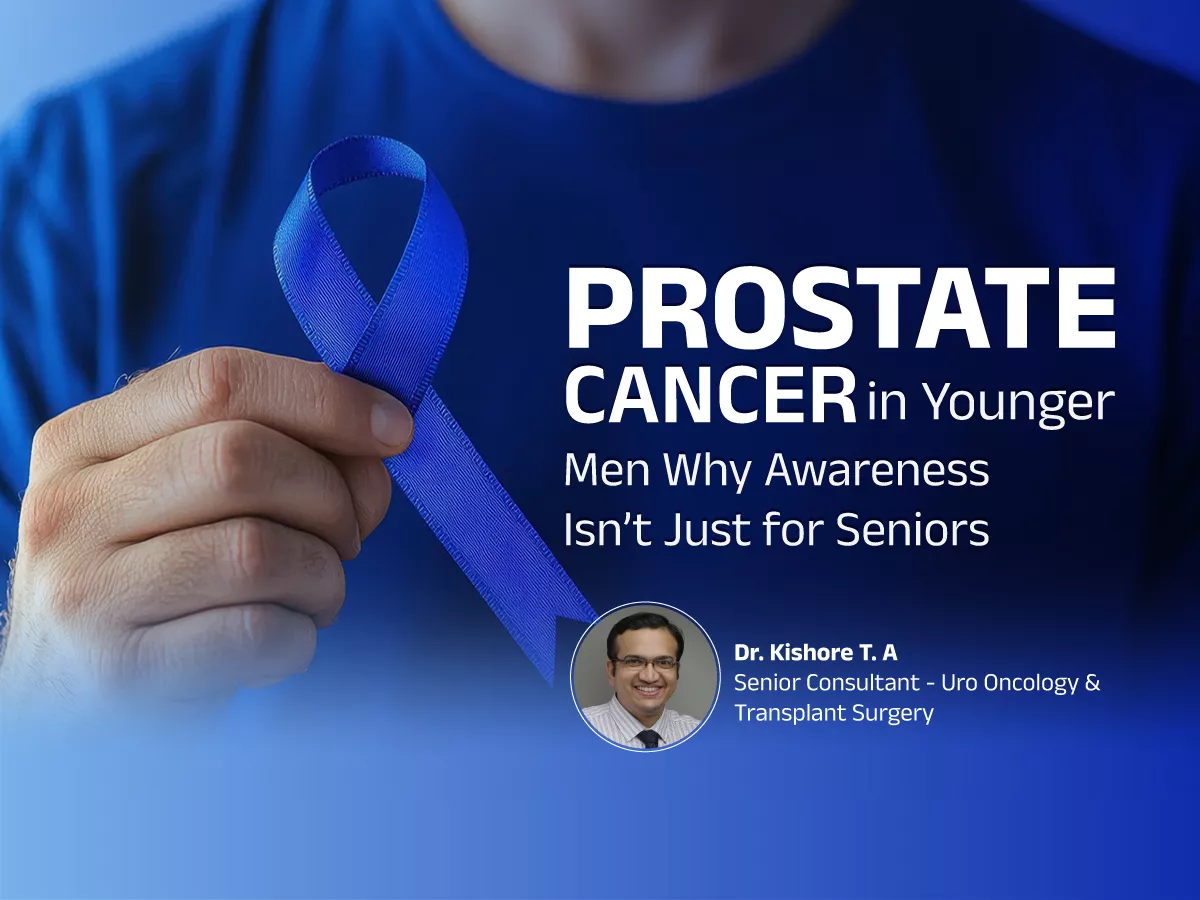Prostate cancer has long been considered a disease primarily affecting older men, but recent trends reveal a concerning increase in cases among younger men under the age of 50. While prostate cancer is still most common in men over 65, the growing incidence in younger demographics underscores the need for broader awareness across all age groups. Understanding the risks, symptoms, and proactive measures for prostate health is essential for men of all ages, as early detection and informed lifestyle choices can make a significant difference in outcomes. If you or your loved ones are seeking expert guidance, consulting an experienced oncologist in Kochi Kerala can provide the right advice and timely treatment.
The Rise of Prostate Cancer in Younger Men
Research shows that while prostate cancer predominantly affects older men, diagnoses among men in their 40s—and sometimes even younger—are on the rise. Several factors may contribute to this trend:
Improved Screening and Diagnostic Tools: Increased awareness and advancements in diagnostic tools, such as the prostate-specific antigen (PSA) test, mean that more men are being screened earlier. In some cases, this leads to detection of prostate cancer that might otherwise have gone unnoticed until much later in life.
Genetic Predispositions and Family History: A significant portion of prostate cancer cases in younger men is related to genetics. Men with a family history of prostate cancer are at a higher risk, especially if a close male relative, such as a father or brother, was diagnosed at an early age. Hereditary factors, including mutations in BRCA1, BRCA2, and HOXB13 genes, can increase prostate cancer risk and may also cause it to develop earlier.
Lifestyle and Environmental Factors: Unhealthy lifestyle habits—such as a diet high in processed meats, smoking, physical inactivity, and obesity—are increasingly being linked to prostate cancer risk. These factors can accelerate the development of cancer, potentially leading to earlier onset.
Why Awareness Is Crucial Across All Age Groups
Raising awareness of prostate cancer among younger men can have a powerful impact on early detection, preventive practices, and timely treatment. Here’s why knowledge and proactive measures are so essential, regardless of age:
Early Detection Improves Outcomes: Prostate cancer can be treated more effectively when detected in its early stages. The survival rates for early-stage prostate cancer are significantly higher, with a nearly 100% five-year survival rate for localized cases. However, once the cancer spreads, the prognosis worsens. Since younger men often experience more aggressive forms of prostate cancer, early detection is critical.
Symptoms in Younger Men Are Often Overlooked: Many men under 50 might not associate common prostate cancer symptoms—such as frequent urination, pain during urination, or blood in urine—with a serious condition. Unfortunately, younger men and healthcare providers alike sometimes dismiss these symptoms, assuming they’re caused by less serious issues. Awareness helps both men and doctors consider prostate cancer as a possibility, leading to earlier testing and diagnosis.
Empowering Preventive Health Practices: For men with a family history or other risk factors, regular screenings and lifestyle adjustments can be essential preventive measures. Awareness of risk factors can empower men to adopt healthier habits, such as maintaining a balanced diet, exercising regularly, and avoiding smoking. Lifestyle changes have been shown to reduce prostate cancer risk and improve overall prostate health.
Normalizing Prostate Health Conversations: Cultural barriers often prevent men from discussing prostate health. By promoting awareness across all age groups, we help normalize conversations about prostate health, making it easier for men to seek medical advice without stigma. Younger men who prioritize routine check-ups and openly discuss prostate health contribute to a culture that encourages proactive healthcare.
For those seeking comprehensive care and screening, a trusted cancer hospital in Kochi Kerala can provide access to advanced facilities and multidisciplinary cancer specialists.
Recognizing Symptoms of Prostate Cancer in Younger Men
Symptoms of prostate cancer can vary, and early stages may present no symptoms at all. However, men of all ages should be aware of the warning signs, which may include:
Frequent Urination: Often more noticeable at night, frequent urination can be a sign of prostate issues.
Pain or Discomfort While Urinating: Burning or pain during urination should be addressed, as it may indicate a problem with the prostate.
Blood in Urine or Semen: While not always related to prostate cancer, any signs of blood in urine or semen should prompt immediate medical attention.
Persistent Lower Back, Hip, or Pelvic Pain: These areas can be affected by prostate cancer metastasis, particularly if the cancer has spread.
Difficulty or Painful Ejaculation: Changes in sexual function can sometimes be an early warning sign of prostate issues.
Screening and Preventive Steps for Younger Men
For younger men, routine prostate cancer screening is not always recommended unless there is a significant risk factor, such as family history or known genetic predispositions. However, men in their 40s should discuss their risks with a healthcare provider to determine if early screening, such as PSA testing, may be beneficial. Preventive measures can also play a role in reducing risks:
Regular Physical Activity: Exercise is linked to lower cancer risk and supports overall prostate health.
Healthy Diet: Diets rich in fruits, vegetables, and whole grains, and low in red and processed meats, have been associated with a reduced risk of prostate cancer.
Avoiding Smoking and Limiting Alcohol: Smoking and heavy alcohol use are linked to various cancers, including prostate cancer, and limiting these behaviors is a protective step.
If you are considering screening or treatment options, visiting a reputed oncology hospital in Kochi Kerala ensures access to advanced technology, expert oncologists, and holistic cancer care tailored to patient needs.
Moving Forward: The Importance of Prostate Cancer Awareness for All Ages
While prostate cancer continues to be most prevalent among older men, the increasing rate of diagnoses in younger men highlights the need for greater awareness and early intervention. By spreading awareness and encouraging open discussions, we can empower men of all ages to take control of their prostate health. Early detection and lifestyle choices can make a profound difference in preventing and managing prostate cancer, allowing men to lead healthier lives and reduce their risk of late-stage diagnoses.
Prostate cancer awareness isn’t just for seniors. Educating younger men, their families, and the broader community is key to ensuring that prostate health is prioritized and that men have the knowledge and resources they need to take proactive steps at any age.











